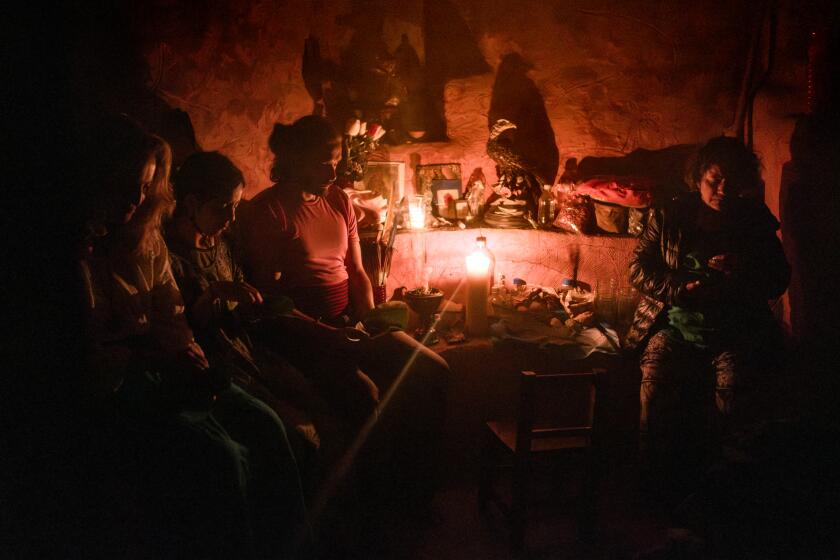Iraq’s tribes: divisive or decisive?
When the Sunni Muslim sheik sent his representatives into the heaving Baghdad slum where a Shiite Muslim militia holds sway, many thought he was courting disaster. Sunnis mutter darkly that the only members of their sect who enter Sadr City are the ones stuffed into the trunk of a car.
But on this occasion, the head of a Shiite family stood up and recited a poem calling Abdul Sattar Rishawi “the honest, the decent, the good sheik, who would not bow his head in humiliation.” The sheik’s representatives were so pleased, they asked him to read it again.
This kind of bold move has persuaded the U.S. command to champion tribal leaders such as Rishawi as a way around the government stalemate in Baghdad. Rishawi has formed an alliance of Sunni Arab tribes that are fighting Al Qaeda-linked insurgents in Al Anbar province. Military leaders, who have provided weapons and other material to some tribal groups there, hope that Rishawi’s effort can be replicated in other provinces.
But some Western officials question the wisdom of encouraging tribalism in Iraq, when such loyalties have helped to cripple development and stir conflict in other parts of the world. Iraq’s Shiite-led government also is uneasy over the alliances, which Prime Minister Nouri Maliki warns could end up creating even more militias if weapons fall into the wrong hands.
On Friday, Maliki said intelligence officials had information that “enemies are attempting to infiltrate this process in order to serve their own interests.” In a statement, he announced that he had formed a committee to oversee the arming of tribes, saying, “All such activity should be overseen by the government.”
Although tribes can offer effective leadership at the grass-roots level, their shifting loyalties and frequent clashes among them present risks on a national stage.
“You’ve always got to be careful when using tribal leaders -- they’re available to the highest bidder,” said one diplomat, who spoke on condition of anonymity.
Although the tribes have proved a potent force against Al Qaeda in Iraq, others worry that any power and weapons given to them now will not be easily taken away when that threat is gone. If too much authority devolves to them, some in government fear, the country may begin to look uncomfortably like Afghanistan or northwest Pakistan.
“Tribes mean informal laws, which are against the principles of
--
An alternative to Baghdad
But frustration is building in Washington with Maliki’s government, which has failed to push through the legislative reforms that U.S. officials believe will help win over the disaffected Sunni minority that has felt powerless since Saddam Hussein’s ouster and is now driving the insurgency. They include jobs for former members of Hussein’s Baath Party, and a fair distribution of Iraq’s oil wealth.
The No. 2 U.S. commander in Iraq, Army Lt. Gen. Raymond T. Odierno, told reporters recently that he was encouraging commanders to strike deals with tribes, religious leaders and local insurgent groups that could help build reconciliation from the bottom up.
“Engaging with the tribal entities and others has made a huge difference,” he said. With their encouragement, recruitment into the Al Anbar security forces has shot up to more than 12,000 so far this year, compared with 1,000 in all of 2006, he said. And attacks in what was once the most dangerous region outside Baghdad have dropped to just over 400 last month, from 811 in May 2006.
Odierno acknowledged that the success in Al Anbar, which is overwhelmingly Sunni Arab, may not be easily replicable in other regions where there are volatile mixes of Sunnis, Shiites and ethnic Kurds. But U.S. officers say tribal leaders possess unrivaled knowledge of what goes on in their areas, and can be an effective force to secure them. They can also be an initial conduit for development aid.
Maliki’s plan to put the government in charge of the arming process could, in effect, stall the grass-roots deals that the military is pursuing and that tribal leaders say should have been made long ago.
“In all countries, you can’t do anything without the people, and the people of Iraq are tribal,” said Faleh Dulaimi, media advisor to Rishawi, who heads the Abu Risha tribe.
Analysts estimate that at least three-quarters of the Iraqi people are members of one of the country’s roughly 30 tribal confederations that group hundreds of tribes, clans and extended families. Through the centuries, this complex network has provided the basis on which Iraq’s largely feudal society was organized.
Hussein’s Baath Party officially rejected the system as backward, banning the use of tribal names on official documents, and promoting Arab nationalism. But key positions were filled by members of Hussein’s clan, which dominated the elite. Later, Hussein openly encouraged tribalism during his disastrous 1980s war with Iran and the 1991 Persian Gulf War.
When U.S. authorities banned the Baath Party and dismantled the Iraqi military in 2003, they wiped out some of the few unifying groups that existed in Iraq. The political formations that make up the current government are mostly based on ethnicity and religion.
Rishawi is dismissive of Iraq’s politicians, many of whom spent years in exile, and who, he alleges, continue to do the bidding of their foreign backers.
“They have an outside agenda and they do not understand the people,” he said in a recent interview. “When I talk to them, they just give me a long speech about Islam -- as if they are actors.”
--
National aspirations
Rishawi’s ambitions extend far beyond his base in Ramadi, capital of Al Anbar. He has launched a national political party called the Iraqi Awakening Conference, which he says will encourage reconciliation among all sects and ethnicities. The sheiks are reaching out to other groups through meetings such as the one in Sadr City and want to field candidates in provincial elections that are supposed to be held by year’s end.
“Sectarianism brought us nothing but destruction,” he said. “What does it matter if a person prays this way or that way? We are all praying to God.”
As if to underscore the point, a battle rages at a market across the river from the once-grand Baghdad hotel where Rishawi is holding court recently, receiving a parade of visitors. Police, soldiers and gunmen in civilian clothes surge across the bridge to the fight. The streets are sealed off, helicopters buzz overhead, and occasional bursts of gunfire pop in the distance.
But inside the hotel, calm prevails. A waiter arrives to take the order for the next round of tea. A guard approaches, fiddling absent-mindedly with his assault rife, and accidentally shoots a hole in the marble floor. The gunshot reverberates through the high-ceilinged lobby, sending up a cloud of dust that briefly shrouds the scene.
Rishawi, regal in a crisp white dishdasha, gold-rimmed cloak and diamond-studded ring, does not stop talking or look up as the hapless guard is unceremoniously escorted away.
Asked about his political aims, Rishawi does not answer directly.
“Now, my main goal is to reunify the society and defeat terrorism,” he said. But, interjects Dulaimi, “after achieving all these aims, the masses will definitely turn to the new leaders who did something.”
Rishawi nods approvingly.
Analysts believe Rishawi is trying to position himself as the legitimate representative of Sunni Arabs and a credible negotiating partner.
On the Kurdish and Shiite sides, there are leaders such as radical Shiite cleric Muqtada Sadr who have influence in parliament and also command powerful militias, said Vali Nasr, a Middle East expert at the Naval Postgraduate School in Monterey. But there are no Sunni politicians who control the insurgency, he said.
“That’s why these tribal leaders, everyone views them as such a promise,” he said. “The assumption is that they represent a chunk of territory, a chunk of people, and they potentially can deliver.”
Shiite tribal leaders have noted Rishawi’s sudden rise and see in him a potential ally in the fight against Sunni militants. Rishawi’s success in leveraging funding and weapons for his Anbar Salvation Council from U.S. and Iraqi sources has not gone unnoticed, either.
For the U.S., however, working through the tribes has risks.
Iraq’s tribal system is complex, with a different leader, or sheik, at every level.
“Because there are so many sheiks, finding one with a significant degree of authority can be a challenge for U.S. occupiers,” Sharon Otterman wrote in a 2003 paper for the Council on Foreign Relations.
Although tribal leaders have traditionally been able to come together in a crisis, relations are fluid and frequently testy.
“Tribal leadership is extremely cautious about appearing to surrender prerogative or authority to another tribe,” said Marine Brig. Gen. John Allen, the No. 2 commander in Al Anbar.
Already, tensions are emerging. Rishawi heads one of the smaller branches of the powerful Dulaimi tribal confederation. Other families in the group recently launched the rival Al Anbar Tribal Sheiks Council.
The new alliance’s public face is Ali Hathem Suleiman, whose late father was one of the province’s most influential leaders, though he has yet to prove himself. Suleiman says he supported the Anbar Salvation Council when its purpose was to fight Al Qaeda, but says it has become a political vehicle for Rishawi.
“Abu Risha wants to be the sheik of all Al Anbar,” he complained, using Rishawi’s nickname.
Suleiman accused members of the Anbar Salvation Council of corruption and other abuses.
He also warned that the United States’ policy of equipping tribesmen who join the police and auxiliary units was in effect arming tribal militias that could one day turn their guns against their benefactors, Shiite rivals or one another.
“We will get rid of the Al Qaeda problem,” he said. “But then there will be militias, and Al Anbar will be sitting on a powder keg.”
--
Times staff writers Tina Susman, Ned Parker, Raheem Salman and Wail Alhafith contributed to this report.
More to Read
Sign up for Essential California
The most important California stories and recommendations in your inbox every morning.
You may occasionally receive promotional content from the Los Angeles Times.










